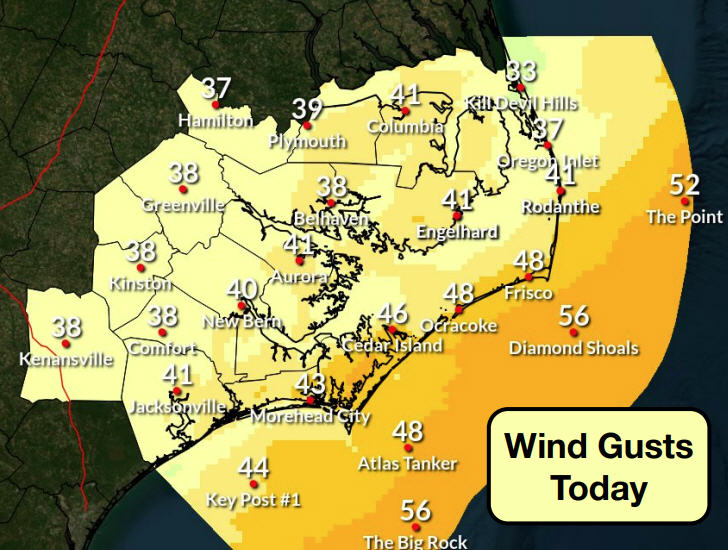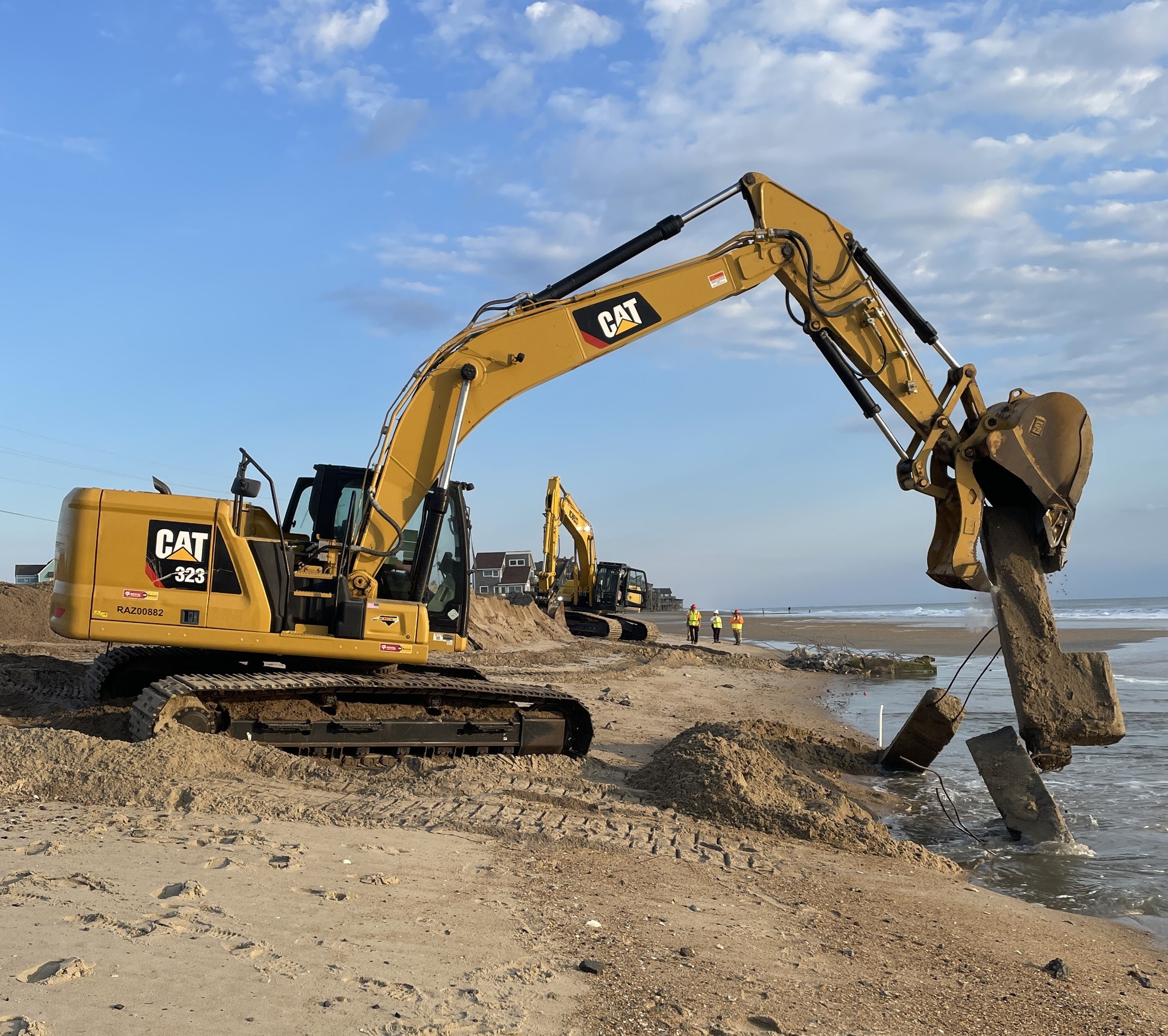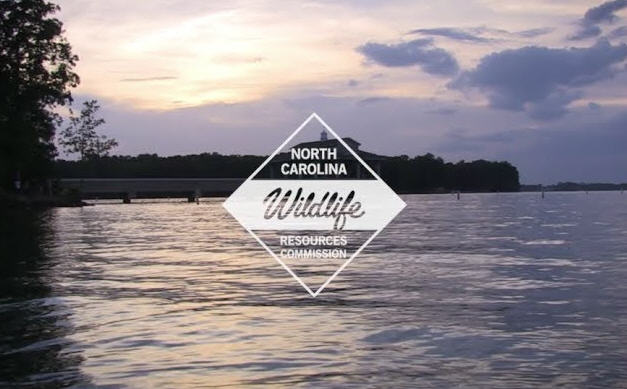Commentary: Inlet issues engender distrust and divisiveness
For the third time in about 10 weeks, the Dare County Board of Commissioners (BOC) has been notified by N.C. Senator Bill Cook’s office that major funding changes have been made to proposed legislation, which if signed into law is, in part, to support the dredging of Oregon Inlet. Such legislation is ordinarily developed at the behest and with the input of the local elected officials and discussed in public in some manner before language is inserted in bills.
And, again, the notification has been right before a weekend when it is more difficult to get the word out.
But this has not been an ordinary process and it appears that the only “for-sure” is that there will be more surprises – or shocks – and no transparency.
Most, if not all the board members, have been left out of the process, and it appears that members of an advisory board appointed by the BOC is dealing directly with Cook’s office without an apparent authority to do so.
Dredging the inlet is supported by the BOC and the public, but the manner in which the situation has been handled has led to distrust and divisiveness at every turn.
The latest twist is a proposed tax on all boats at least 24 feet long owned by holders of coastal recreational fishing licenses, standard commercial fishing licenses, retired standard commercial fishing licenses, shellfish licenses, recreational commercial gear licenses and for-hire licenses. The tax is to fund the Shallow Draft Navigation Channel Dredging and Lake Maintenance Fund, which is to provide matching funds for dredging projects. Local government must provide the other half of the needed revenues.
The new tax caught both the commissioners and apparently fishing groups by surprise.
Jerry Schill, director of the North Carolina Fisheries Association, which represents commercial fishing interests, said he found out about it only on Thursday, May 14 – the day it was amended into the existing dredging bill. He said he doesn’t know yet what his members think about it.
“After the large increase in commercial license fees that we advocated, I can guess though,” said Schill.
Schill will seek answers when he goes to Raleigh on Tuesday.
An agreement between the state and the National Marine Fisheries Service allows the flounder fishery to operate only with the presence of observers to see that there aren’t interactions with turtles. The observer program cost about $1 million per year, and the state has pulled the funding. To keep the fishery open, commercial fishermen volunteered to pay substantially higher fees for their fishing licenses to fund the program. The new fees went into effect last month.
In a response to a query from someone else about where the boat tax suggestion originated, Cook’s legislative aide, Jordan Hennessy, replied: “This was discussed among Harry [Schiffman] and others on the Dare County Oregon Inlet Task Force.”
Oregon Inlet Task Force meeting minutes do not reflect such a conversation. The April minutes were not available in time for this commentary but two people who attended confirmed that there was no discussion.
But that doesn’t mean that the Task Force members didn’t talk about the issue because since its inception, at least some in the group have apparently worked to circumvent the open meetings laws.
The BOC agreed to form the Oregon Inlet Task Force after a contingency of inlet users approached the board about needing to find a solution to the constant shoaling of the inlet.
On Jan. 22, 2013, the names of the Task Force members were approved based on names submitted to the board.
They were Jim Tobin, Harry Schiffman, Mikey Daniels and John Bayliss from the Oregon Inlet Users Group, Dave May from the Oregon Inlet and Waterways Commission, Carl “Pogey” Worsley, chairman of the Wanchese Seafood Industrial Park Authority Board, and Commissioner Bob Woodard.
Less than a month later, sparks flew during a Task Force report to the BOC. Task force chairman, Jim Tobin, reported that the “Users Group” met and was trying to formulate a plan to move forward. He also mentioned other meetings of the Task Force that included only three of the seven committee members because no one else was invited – including Woodard, who was the board’s appointment to the committee.
The late Commissioner Richard Johnson told Tobin that he was concerned that there were several things happening with the Task Force that Woodard was unaware of because he wasn’t kept in the loop or notified of meetings. “Keep him informed because he is who I’m going to go to. Make sure he is informed about stuff.”
Tobin said Woodard was invited to all meetings. “But I am [Tobin’s emphasis] the chairman of the committee, and I think everyone on our committee should have equal representation,” argued Tobin.
Woodard responded that “There are other meetings going on besides the Task Force – (we) have to get our arms around not so many meetings. There were conference calls on Thursday and Friday that I was unaware of – that’s not going to fly with this board or with me…In the future, I need to know about them…
“(There) can’t be additional meetings outside the Task Force without it being brought to this board. There are two or three meetings here or there without it coming to the Task Force and this board – everything needs to come before the Task Force for a vote and to this board.”
Tobin responded that he had been told that as long as only three members were present, meetings don’t have to have public notice.
“You are saying you are keeping it under four. You have to comply with the law or people aren’t going to trust things,” said Johnson.
Tobin still appeared to resist understanding that there is a legal process that must be complied with. And he seemed irritated when told that a contract that he said the Task Force wanted to enter into for a study would have to go through a request for proposals per the law.
Johnson, apparently frustrated by Tobin’s arguments, said: “You asked this board to make you legitimate by making you a Dare County Task Force. We are asking that you make yourself legitimate by having legitimate meetings, advertising your meetings, and including everyone.”
In April 2013, Woodard, on behalf of the Task Force, asked if the board would agree to reimburse the users group $16,510 for a November 2012 study by Coastal Engineering — before the Task Force was formed. The board agreed and the check was made out to Oregon Inlet Users Association. There was no invoice provided, said Dare County Finance Director Dave Clawson. The bill was paid based on the board motion.
The finance office checked the IRS status of the association to confirm the address to which the check was to be mailed. According to IRS records, that address was the correct address for the group, but the group had not filed required tax returns for several years and was no longer a legal non-profit entity.
That’s not surprising given that the Oregon Inlet Users Association disbanded in 1993. One of the original incorporators recently confirmed that fact.
And although the address on file with the IRS – P.O. Box 612, Wanchese – was for many years where the organization’s mail was sent, according to records in the Secretary of State’s Office, that post office box is listed on the 2010 original incorporation filings for Michael J. Daniels Insurance Services. And the address was listed on a required annual report filed in 2013.
So who are the members of the group calling themselves by that name?
Apparently, members of the Dare County Oregon Inlet Task Force.
Frequently in minutes of meetings, there are references made to user group meetings that were held to discuss something or to make plans. It appears that the name is being used to avoid public meetings of the Task Force. Adding credibility to this thought is a meeting held earlier this month.
On May 2, Task Force member Harry Schiffman sent the following e-mail to those who had attended a meeting the day before in the county Administration Building.
“Recap on Users’s Assoc. meeting with Bob Woodard, Wally Overman, Warren Judge, Jim Tobin, Mikey Daniels, Bob Peele, Jenny Gray Jones, Harry Schiffman:
“After considerable discussion It is my understanding that agreement was reached amongst those in attendance to:
“1. Transfer duties from the Oregon Inlet Waterways Commission to the Task Force along with two members of the Commission, namely Jed Dixon to fill John Bayliss’s seat and Ernie Foster to fill Dave May’s seat on the Task Force, i.e. keeping the number of members to the original setting of seven (7). The focus and highest priority to remain on Oregon Inlet. Task Force to continue to operate in the same manner as it has.
“2. As to a name change, there was no agreement reached. Several suggestions were tossed around but none were welcomed by all. Daniels, Peele, Tobin & Schiffman appear committed to the belief that a name change would lead to confusion and concern by contacts in Raleigh, Washington D.C., Wilmington NC, and with other contacts developed and nurtured since the inception of the Task Force. These beliefs are a result of past experiences over many years as relates to efforts with the O.I. Project.
“3. All agreed we would continue in the same fashion as that which got us to this point with O.I., i.e. as a team. None of the to date success would likely have developed without all members of the team pulling in a similar direction, yet via various conduits.
“A personal point on the name change desires of the Commissioners. If hell-bent on making a name change, the least potentially damaging that I heard was ‘Dare County Advisory Task Force on Oregon Inlet and Waterways.’ It was also mentioned that when a decision came forth to dissolve the O.I. Waterways Comm., an explanation could be made that the waterways responsibilities would continue under the Task Force, i.e. Hatteras Inlet, Stumpy Point, other waterways, etc..
“Note: First run subject to changes, corrections from others. Thanks for your time and the discussion. Harry”
Obviously, the business discussed at the meeting was county business – not that of an outside group. And those present were commissioners and a quorum of the Task Force. And there was a county staff member who is assigned to the Task Force. If it walks like a duck, looks like a duck…
The Task Force minutes from September 2014 include conversation about possibly using sand from the dredging project to nourish beaches
And it includes discussion about “Cook’s fundraiser,” which is not an appropriate subject for any public body. The meeting occurred just a few days after Tobin and Daniels sponsored a fundraising event for the senator at Pirate’s Cove Marina, owned by Tobin.
Meeting minutes reveal little except mostly the same conversations at each meeting.
In March 2015 when proposed legislation popped up that would, if passed into law, give the county control of all 6 cents of occupancy tax, it appeared to be a surprise for the commissioners and, most certainly, the public.
The board offered an alternate proposal to instead ask for a 1/4-cent sales tax to be levied without a referendum and dedicated to dredging. Rep. Paul Tine, U-Dare, introduced the bill in the House and it flew through the process because legislators understood the need to get the inlet cleared. But since it arrived in the Senate, the local bill has not been pushed forward by Cook.
Other senators who serve with Cook say that they see the importance and reasonableness of the sale tax request but that because it is a local bill, Cook must let it be known that he wants to see it move forward. He hasn’t.
Although the dredging bill now includes the new tax on coastal fishing boats to pay the state’s share of the matching funds, Hennessey had this to say about the sales tax which would have increased tax by 25 cents on each $100: “The commissioners requested for the General Assembly to give them the authority to raise taxes without the vote of the public. That doesn’t seem to be transparent at all.”
The language now in the bill to provide the county’s share will allow taking $3 million per year for five years out of the occupancy tax for beach nourishment. At the end of five years, the money reverts back to the beach nourishment use. The $3 million is not enough to support dredging Hatteras Inlet, which also badly needs dredging.
The sales tax could have provided a long-term stream of revenue to help pay for both needs. Although it initially could be levied without a referendum, within five years, voters would decide the issue.
Commissioner Beverly Boswell, who is now on the Task Force, insists that dipping into the occupancy tax is a better plan.
In response to press questions on May 10 about whether she requested the second proposal, which will take $3 million a year from the beach nourishment occupancy tax, she replied:
“Did I ask Senator Cook (via Jordan I believe) to help find funding for dredging? Absolutely! Did I inquire about the possibility of changing the allocation of funds of the Occupancy Tax? Yes. Did I give or get specifics ? No. I actually wanted to increase the occupancy tax. I thought that this would be a good route for funding the project.
“I supported the bill that the Senator proposed because it was a good way to fund the dredging projects. Just like beach nourishment, let the visitors pay for dredging.”
Boswell is the BOC liaison assigned to the Task Force but when asked if Tobin or Schiffman requested the changes in occupancy tax and, if so, where did they get the authority to do so, she replied: “I have no idea what Jim or Harry have said or done. I can only speak for myself.”
Shortly before that, Cook’s aide, Hennessey, also refused to divulge whether specific requests are coming from the Task Force members or from a commissioner or commissioners.
And recently, other topics have become intertwined with the Oregon Inlet dredging issues.
Many are shaking their heads as they try to understand and sort out all the talk about dredging Oregon Inlet, Hatteras Inlet dredging concerns, combining the Oregon Inlet and Waterways Commission with the Oregon Inlet Task Force, and proposed legislation that pops up out of the blue and seeks to redistribute occupancy dollars. The four topics have become part of the same conversation but are really vastly different issues.
The only thing that all interested parties seem to agree on is that both Oregon Inlet and Hatteras Inlet are in dire need of regular dredging.
The common denominator in all the controversies seems to be the Oregon Inlet Task Force. Not only do we have problems with inlets – there also is a problem of credibility.
(Sandy Semans is a retired newspaper editor and reporter who now works as a free-lance writer. She lives in Stumpy Point)

















